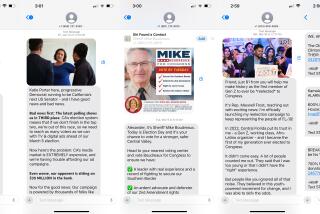FCC moves to expand ability to send texts to 911 in emergencies
WASHINGTON -- Federal regulators moved Thursday to expand the ability of people to send texts to 911 in emergencies, and are working on rules that would require wireless carriers to enable such messages by the end of the year.
The Federal Communications Commission voted unanimously that texting to 911 should be widespread, and to begin soliciting comments from the public and industry about whether a Dec. 31 deadline for establishing the capability would be feasible.
“Access to 911 just simply has to keep pace with technological change,” said FCC Chairman Tom Wheeler.
PHOTOS: Google unveils new Glass frames
The actions are part of a broader move by the FCC to modernize the 911 system. This month, the commission began looking into the problem of calling 911 from hotels and motels, which normally require a person to first dial 9 to get an outside line.
In December, a Texas woman was stabbed to death in a motel while her 9-year-old daughter unsuccessfully tried four times to call 911 for help.
Wheeler and other commissioners said the ability to send text messages to 911 was crucial to people with impaired hearing or speech and could help in situations, such as domestic violence incidents, in which a voice call can’t easily be made. In addition, texting has become the preferred way of communicating for many people.
However, FCC officials cautioned that calling 911 is better than texting because it helps emergency personnel more easily get information about the situation.
The four largest wireless carriers -- AT&T, Verizon, Sprint and T-Mobile -- have voluntarily agreed to provide 911 texting by May 15 in all areas served by emergency call centers that can receive those messages.
But most so-called public safety answer points don’t have the ability to receive text messages.
The Cal State Long Beach Police Department can receive 911 texts from Verizon customers, but that is the only jurisdiction in California that had the capability as of Jan. 15, according to the FCC.
Iowa, Maine and Vermont can receive 911 texts from some carriers, as can about two dozen counties elsewhere nationwide.
As of Sept. 30, 2013, all text-messaging providers were required to send an automatic bounce-back message to anyone who tries to text 911 in an area where the service isn’t available.
The FCC wants to expand the voluntary commitments from the major wireless companies to all text providers, including Skype and others that offer the service over the Internet. Wheeler said the ability to text 911 should be available no matter what service a person uses.
He also pushed public safety organizations to work harder to be able to receive 911 texts.
“The wireless carriers have done the right thing. The FCC’s done the right thing, and now it’s your turn,” he said.
ALSO:
The Internet of Alcohol Things is coming at last
Facebook unveils Paper, a new way to view stories
AT&T continues T-Mobile spat, offers new, existing users $100 credit







